Developing a Philosophy of Nursing: Career and Practice
VerifiedAdded on 2022/11/11
|17
|5307
|454
Report
AI Summary
This report, a reflection on the author's philosophy of nursing, traces their journey from a student to a professional nurse. It delves into key aspects of the profession, including the nursing profession, the author's personal philosophy, and the application of nursing theories. The report explores the holistic approach to patient care, ethical values, and the importance of nurse-patient interaction in delivering quality care. It also examines the challenges and future scopes of nursing practice. The author emphasizes the interconnectivity of art and science in nursing, highlighting the importance of both empirical knowledge and compassionate care. Furthermore, the report discusses the application of Pavalko’s occupation model, professional development, and clinical supervision, providing a comprehensive overview of the author's perspective on nursing. The author also discusses the role of e-portfolios in career development and highlights the importance of reflective practice in enhancing nursing skills and patient outcomes.
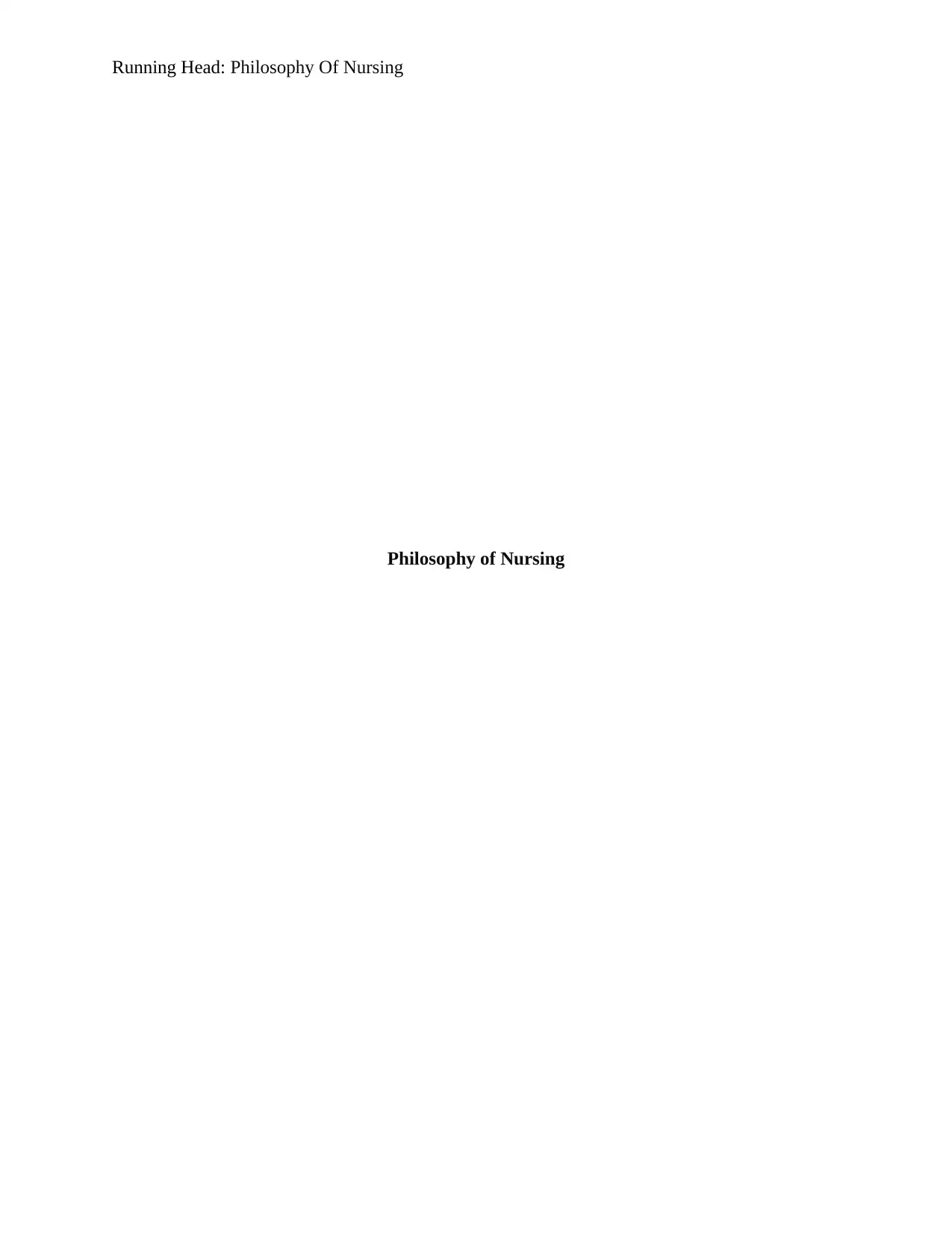
Running Head: Philosophy Of Nursing
Philosophy of Nursing
Philosophy of Nursing
Paraphrase This Document
Need a fresh take? Get an instant paraphrase of this document with our AI Paraphraser
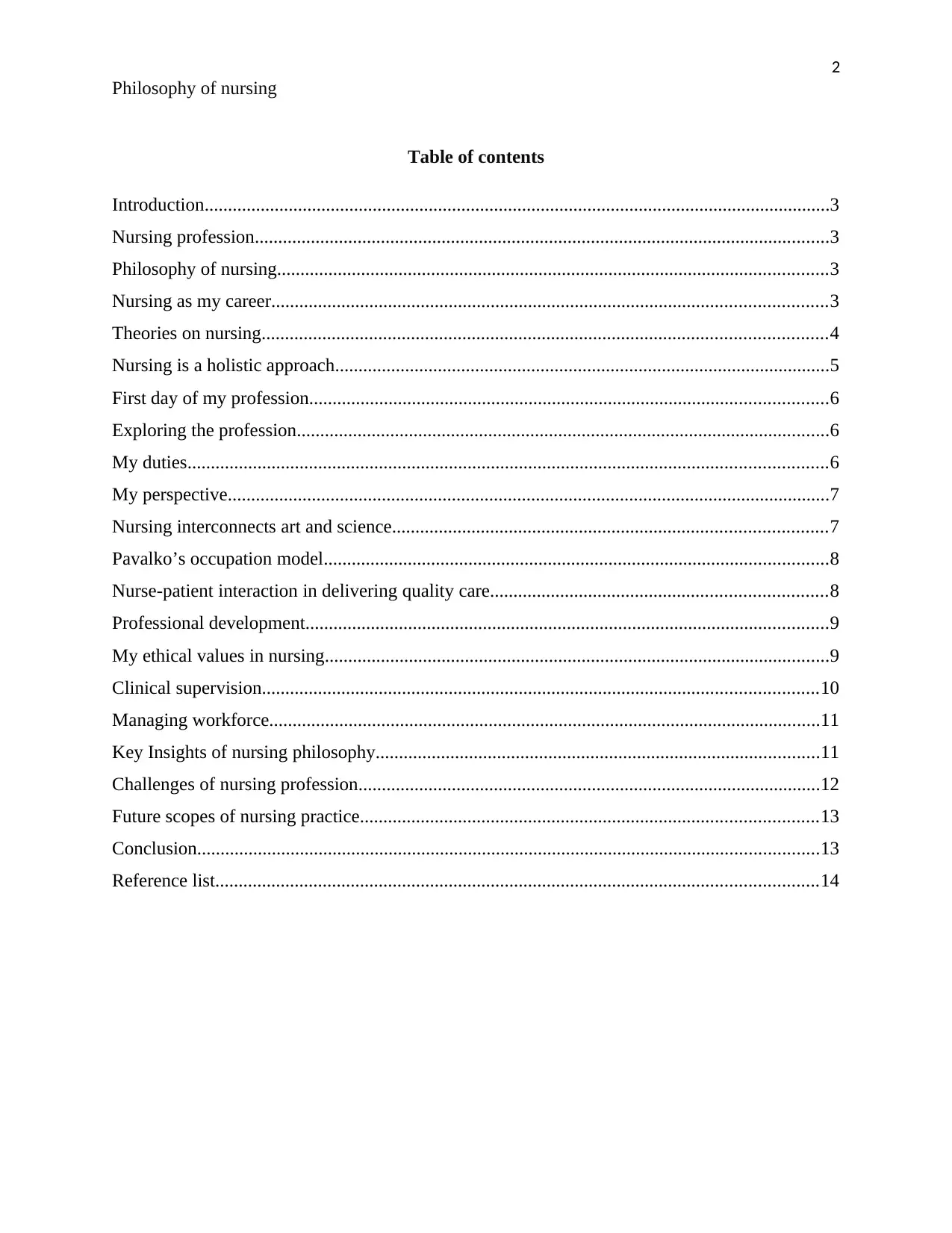
2
Philosophy of nursing
Table of contents
Introduction......................................................................................................................................3
Nursing profession...........................................................................................................................3
Philosophy of nursing......................................................................................................................3
Nursing as my career.......................................................................................................................3
Theories on nursing.........................................................................................................................4
Nursing is a holistic approach..........................................................................................................5
First day of my profession...............................................................................................................6
Exploring the profession..................................................................................................................6
My duties.........................................................................................................................................6
My perspective.................................................................................................................................7
Nursing interconnects art and science.............................................................................................7
Pavalko’s occupation model............................................................................................................8
Nurse-patient interaction in delivering quality care........................................................................8
Professional development................................................................................................................9
My ethical values in nursing............................................................................................................9
Clinical supervision.......................................................................................................................10
Managing workforce......................................................................................................................11
Key Insights of nursing philosophy...............................................................................................11
Challenges of nursing profession...................................................................................................12
Future scopes of nursing practice..................................................................................................13
Conclusion.....................................................................................................................................13
Reference list.................................................................................................................................14
Philosophy of nursing
Table of contents
Introduction......................................................................................................................................3
Nursing profession...........................................................................................................................3
Philosophy of nursing......................................................................................................................3
Nursing as my career.......................................................................................................................3
Theories on nursing.........................................................................................................................4
Nursing is a holistic approach..........................................................................................................5
First day of my profession...............................................................................................................6
Exploring the profession..................................................................................................................6
My duties.........................................................................................................................................6
My perspective.................................................................................................................................7
Nursing interconnects art and science.............................................................................................7
Pavalko’s occupation model............................................................................................................8
Nurse-patient interaction in delivering quality care........................................................................8
Professional development................................................................................................................9
My ethical values in nursing............................................................................................................9
Clinical supervision.......................................................................................................................10
Managing workforce......................................................................................................................11
Key Insights of nursing philosophy...............................................................................................11
Challenges of nursing profession...................................................................................................12
Future scopes of nursing practice..................................................................................................13
Conclusion.....................................................................................................................................13
Reference list.................................................................................................................................14
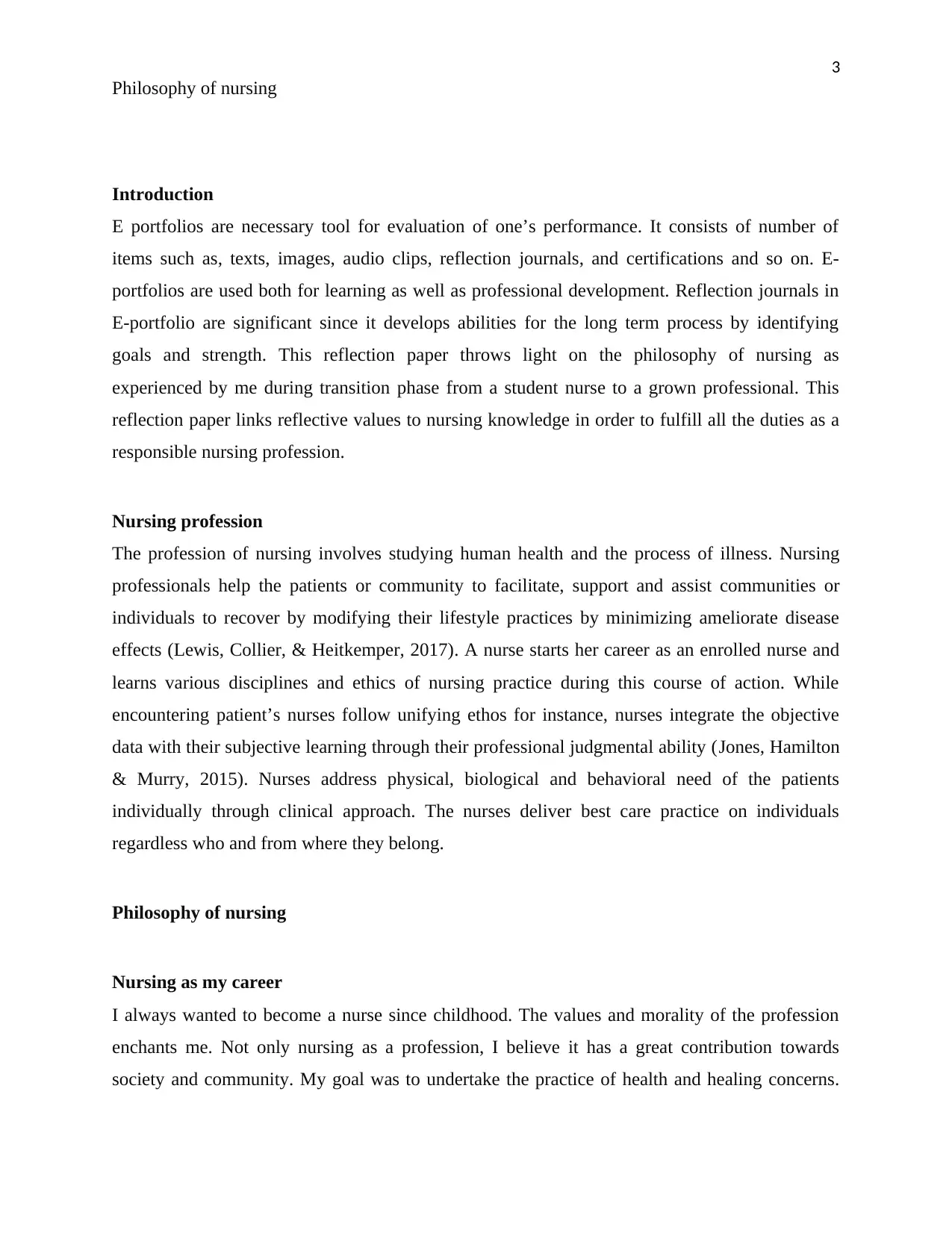
3
Philosophy of nursing
Introduction
E portfolios are necessary tool for evaluation of one’s performance. It consists of number of
items such as, texts, images, audio clips, reflection journals, and certifications and so on. E-
portfolios are used both for learning as well as professional development. Reflection journals in
E-portfolio are significant since it develops abilities for the long term process by identifying
goals and strength. This reflection paper throws light on the philosophy of nursing as
experienced by me during transition phase from a student nurse to a grown professional. This
reflection paper links reflective values to nursing knowledge in order to fulfill all the duties as a
responsible nursing profession.
Nursing profession
The profession of nursing involves studying human health and the process of illness. Nursing
professionals help the patients or community to facilitate, support and assist communities or
individuals to recover by modifying their lifestyle practices by minimizing ameliorate disease
effects (Lewis, Collier, & Heitkemper, 2017). A nurse starts her career as an enrolled nurse and
learns various disciplines and ethics of nursing practice during this course of action. While
encountering patient’s nurses follow unifying ethos for instance, nurses integrate the objective
data with their subjective learning through their professional judgmental ability (Jones, Hamilton
& Murry, 2015). Nurses address physical, biological and behavioral need of the patients
individually through clinical approach. The nurses deliver best care practice on individuals
regardless who and from where they belong.
Philosophy of nursing
Nursing as my career
I always wanted to become a nurse since childhood. The values and morality of the profession
enchants me. Not only nursing as a profession, I believe it has a great contribution towards
society and community. My goal was to undertake the practice of health and healing concerns.
Philosophy of nursing
Introduction
E portfolios are necessary tool for evaluation of one’s performance. It consists of number of
items such as, texts, images, audio clips, reflection journals, and certifications and so on. E-
portfolios are used both for learning as well as professional development. Reflection journals in
E-portfolio are significant since it develops abilities for the long term process by identifying
goals and strength. This reflection paper throws light on the philosophy of nursing as
experienced by me during transition phase from a student nurse to a grown professional. This
reflection paper links reflective values to nursing knowledge in order to fulfill all the duties as a
responsible nursing profession.
Nursing profession
The profession of nursing involves studying human health and the process of illness. Nursing
professionals help the patients or community to facilitate, support and assist communities or
individuals to recover by modifying their lifestyle practices by minimizing ameliorate disease
effects (Lewis, Collier, & Heitkemper, 2017). A nurse starts her career as an enrolled nurse and
learns various disciplines and ethics of nursing practice during this course of action. While
encountering patient’s nurses follow unifying ethos for instance, nurses integrate the objective
data with their subjective learning through their professional judgmental ability (Jones, Hamilton
& Murry, 2015). Nurses address physical, biological and behavioral need of the patients
individually through clinical approach. The nurses deliver best care practice on individuals
regardless who and from where they belong.
Philosophy of nursing
Nursing as my career
I always wanted to become a nurse since childhood. The values and morality of the profession
enchants me. Not only nursing as a profession, I believe it has a great contribution towards
society and community. My goal was to undertake the practice of health and healing concerns.
⊘ This is a preview!⊘
Do you want full access?
Subscribe today to unlock all pages.

Trusted by 1+ million students worldwide
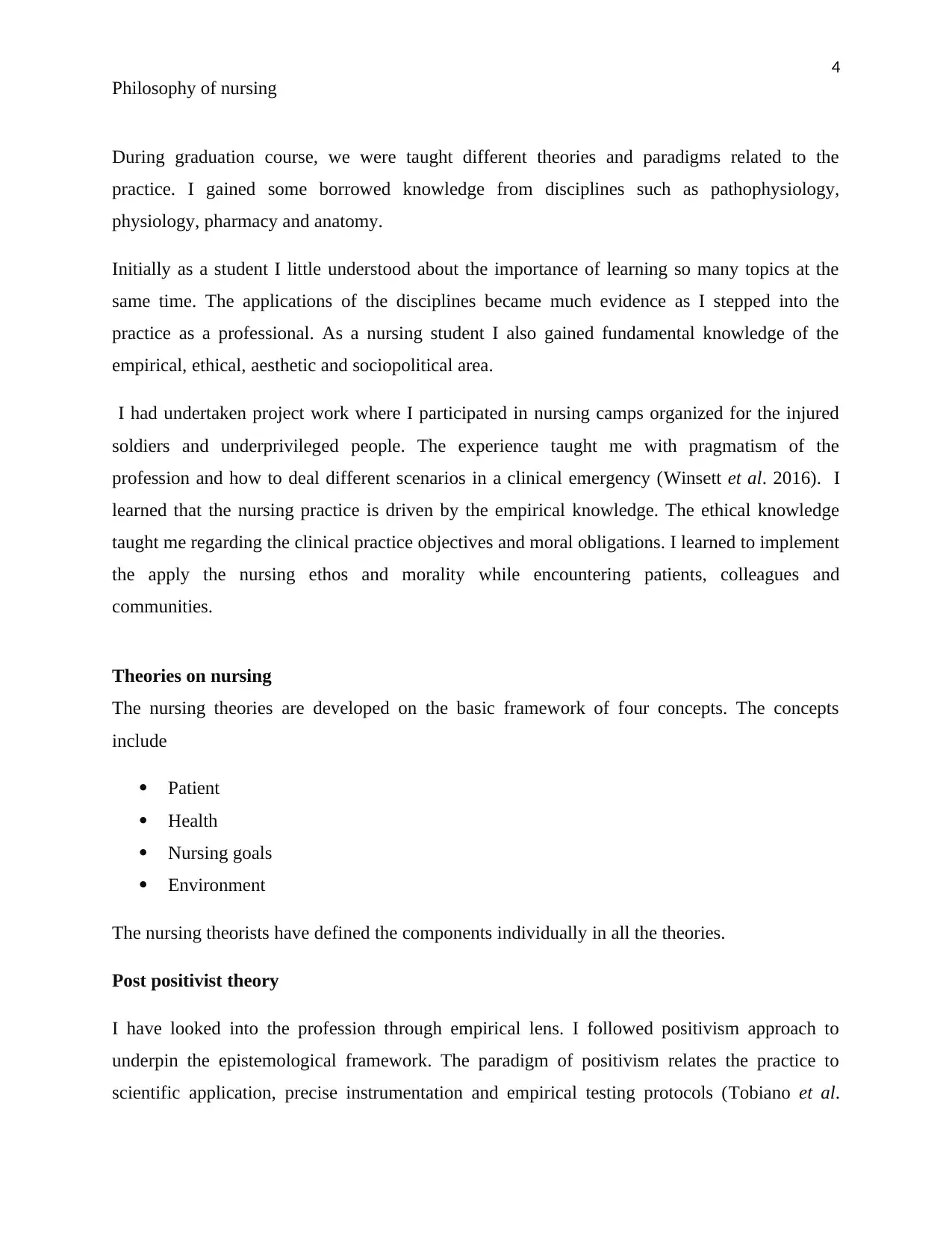
4
Philosophy of nursing
During graduation course, we were taught different theories and paradigms related to the
practice. I gained some borrowed knowledge from disciplines such as pathophysiology,
physiology, pharmacy and anatomy.
Initially as a student I little understood about the importance of learning so many topics at the
same time. The applications of the disciplines became much evidence as I stepped into the
practice as a professional. As a nursing student I also gained fundamental knowledge of the
empirical, ethical, aesthetic and sociopolitical area.
I had undertaken project work where I participated in nursing camps organized for the injured
soldiers and underprivileged people. The experience taught me with pragmatism of the
profession and how to deal different scenarios in a clinical emergency (Winsett et al. 2016). I
learned that the nursing practice is driven by the empirical knowledge. The ethical knowledge
taught me regarding the clinical practice objectives and moral obligations. I learned to implement
the apply the nursing ethos and morality while encountering patients, colleagues and
communities.
Theories on nursing
The nursing theories are developed on the basic framework of four concepts. The concepts
include
Patient
Health
Nursing goals
Environment
The nursing theorists have defined the components individually in all the theories.
Post positivist theory
I have looked into the profession through empirical lens. I followed positivism approach to
underpin the epistemological framework. The paradigm of positivism relates the practice to
scientific application, precise instrumentation and empirical testing protocols (Tobiano et al.
Philosophy of nursing
During graduation course, we were taught different theories and paradigms related to the
practice. I gained some borrowed knowledge from disciplines such as pathophysiology,
physiology, pharmacy and anatomy.
Initially as a student I little understood about the importance of learning so many topics at the
same time. The applications of the disciplines became much evidence as I stepped into the
practice as a professional. As a nursing student I also gained fundamental knowledge of the
empirical, ethical, aesthetic and sociopolitical area.
I had undertaken project work where I participated in nursing camps organized for the injured
soldiers and underprivileged people. The experience taught me with pragmatism of the
profession and how to deal different scenarios in a clinical emergency (Winsett et al. 2016). I
learned that the nursing practice is driven by the empirical knowledge. The ethical knowledge
taught me regarding the clinical practice objectives and moral obligations. I learned to implement
the apply the nursing ethos and morality while encountering patients, colleagues and
communities.
Theories on nursing
The nursing theories are developed on the basic framework of four concepts. The concepts
include
Patient
Health
Nursing goals
Environment
The nursing theorists have defined the components individually in all the theories.
Post positivist theory
I have looked into the profession through empirical lens. I followed positivism approach to
underpin the epistemological framework. The paradigm of positivism relates the practice to
scientific application, precise instrumentation and empirical testing protocols (Tobiano et al.
Paraphrase This Document
Need a fresh take? Get an instant paraphrase of this document with our AI Paraphraser
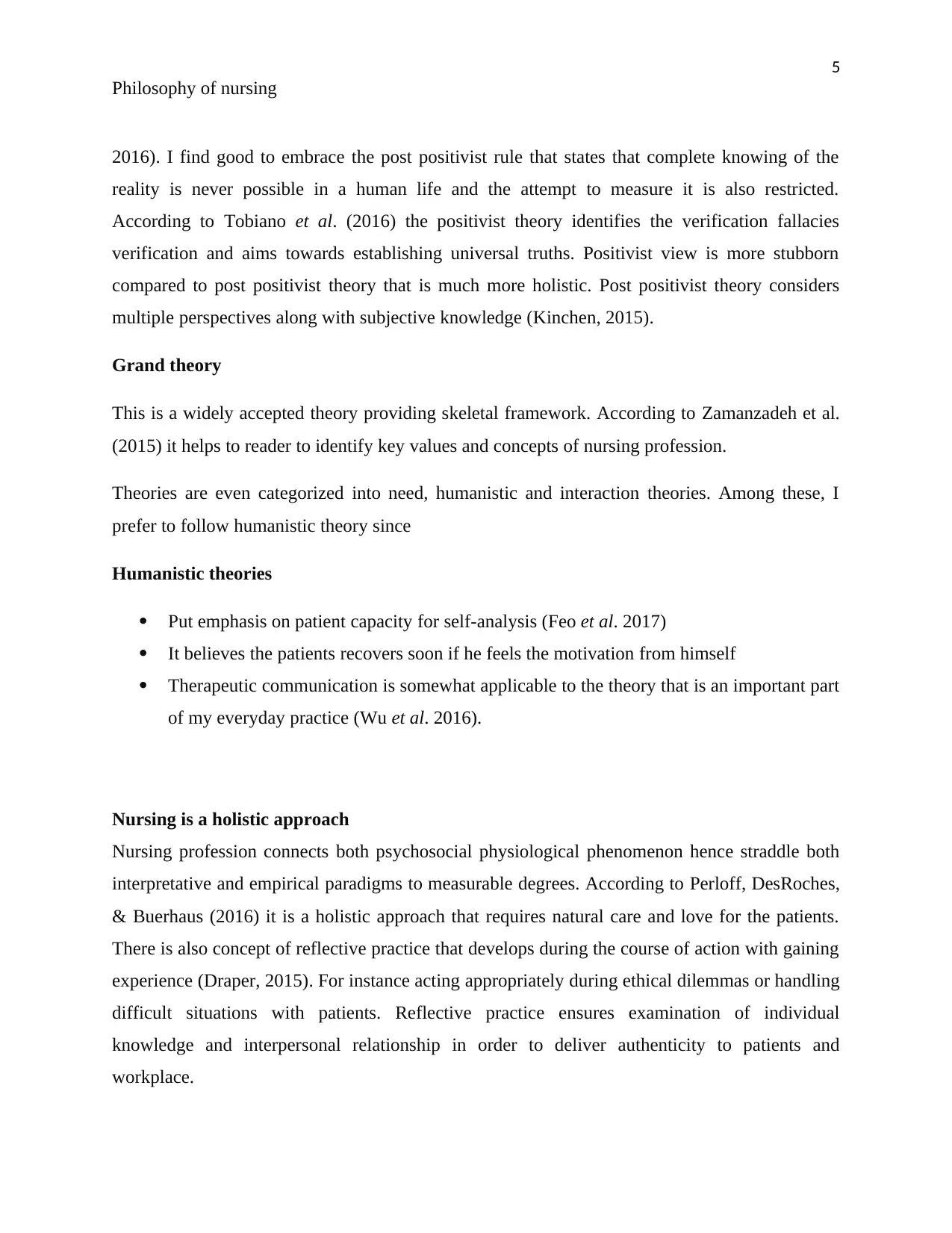
5
Philosophy of nursing
2016). I find good to embrace the post positivist rule that states that complete knowing of the
reality is never possible in a human life and the attempt to measure it is also restricted.
According to Tobiano et al. (2016) the positivist theory identifies the verification fallacies
verification and aims towards establishing universal truths. Positivist view is more stubborn
compared to post positivist theory that is much more holistic. Post positivist theory considers
multiple perspectives along with subjective knowledge (Kinchen, 2015).
Grand theory
This is a widely accepted theory providing skeletal framework. According to Zamanzadeh et al.
(2015) it helps to reader to identify key values and concepts of nursing profession.
Theories are even categorized into need, humanistic and interaction theories. Among these, I
prefer to follow humanistic theory since
Humanistic theories
Put emphasis on patient capacity for self-analysis (Feo et al. 2017)
It believes the patients recovers soon if he feels the motivation from himself
Therapeutic communication is somewhat applicable to the theory that is an important part
of my everyday practice (Wu et al. 2016).
Nursing is a holistic approach
Nursing profession connects both psychosocial physiological phenomenon hence straddle both
interpretative and empirical paradigms to measurable degrees. According to Perloff, DesRoches,
& Buerhaus (2016) it is a holistic approach that requires natural care and love for the patients.
There is also concept of reflective practice that develops during the course of action with gaining
experience (Draper, 2015). For instance acting appropriately during ethical dilemmas or handling
difficult situations with patients. Reflective practice ensures examination of individual
knowledge and interpersonal relationship in order to deliver authenticity to patients and
workplace.
Philosophy of nursing
2016). I find good to embrace the post positivist rule that states that complete knowing of the
reality is never possible in a human life and the attempt to measure it is also restricted.
According to Tobiano et al. (2016) the positivist theory identifies the verification fallacies
verification and aims towards establishing universal truths. Positivist view is more stubborn
compared to post positivist theory that is much more holistic. Post positivist theory considers
multiple perspectives along with subjective knowledge (Kinchen, 2015).
Grand theory
This is a widely accepted theory providing skeletal framework. According to Zamanzadeh et al.
(2015) it helps to reader to identify key values and concepts of nursing profession.
Theories are even categorized into need, humanistic and interaction theories. Among these, I
prefer to follow humanistic theory since
Humanistic theories
Put emphasis on patient capacity for self-analysis (Feo et al. 2017)
It believes the patients recovers soon if he feels the motivation from himself
Therapeutic communication is somewhat applicable to the theory that is an important part
of my everyday practice (Wu et al. 2016).
Nursing is a holistic approach
Nursing profession connects both psychosocial physiological phenomenon hence straddle both
interpretative and empirical paradigms to measurable degrees. According to Perloff, DesRoches,
& Buerhaus (2016) it is a holistic approach that requires natural care and love for the patients.
There is also concept of reflective practice that develops during the course of action with gaining
experience (Draper, 2015). For instance acting appropriately during ethical dilemmas or handling
difficult situations with patients. Reflective practice ensures examination of individual
knowledge and interpersonal relationship in order to deliver authenticity to patients and
workplace.
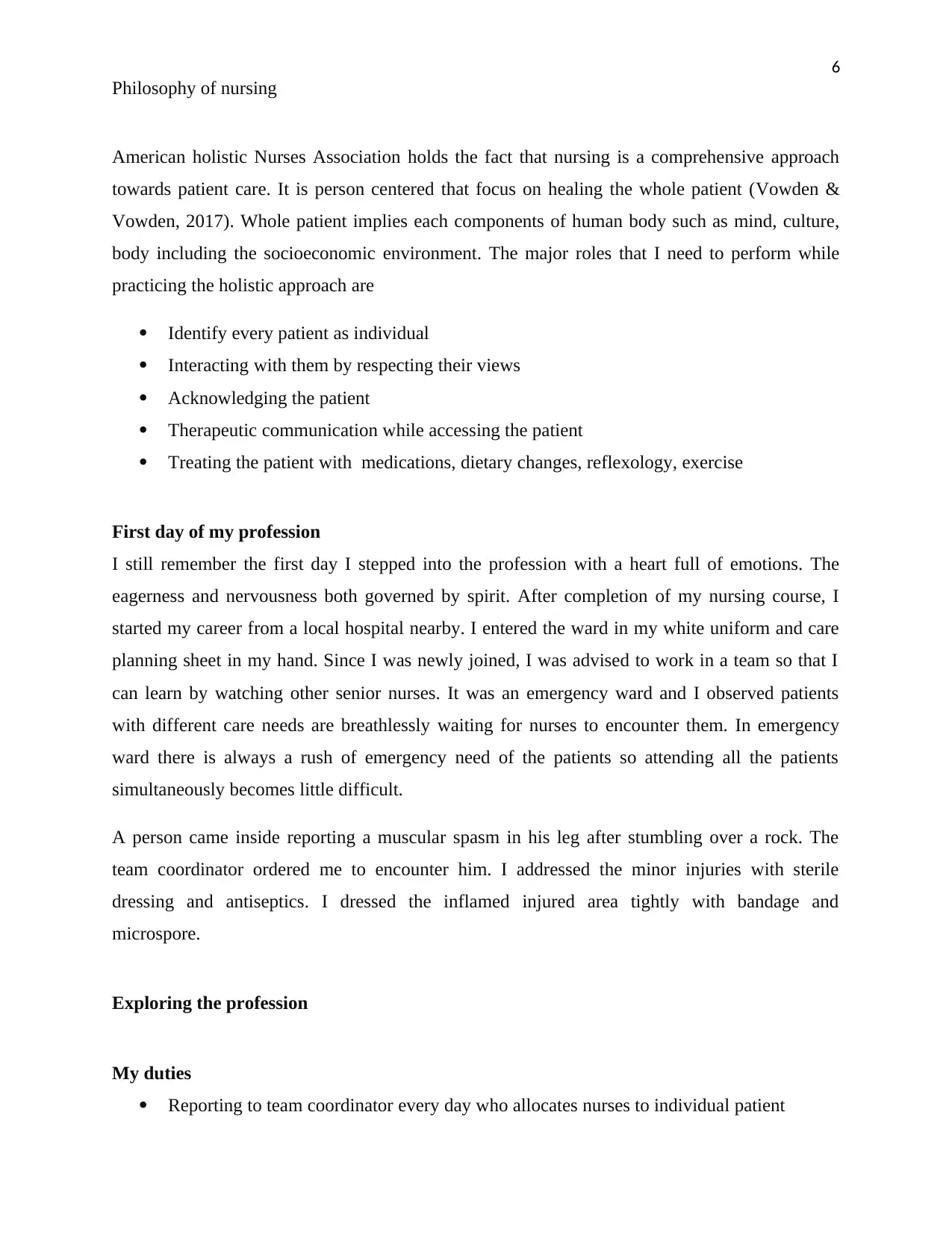
6
Philosophy of nursing
American holistic Nurses Association holds the fact that nursing is a comprehensive approach
towards patient care. It is person centered that focus on healing the whole patient (Vowden &
Vowden, 2017). Whole patient implies each components of human body such as mind, culture,
body including the socioeconomic environment. The major roles that I need to perform while
practicing the holistic approach are
Identify every patient as individual
Interacting with them by respecting their views
Acknowledging the patient
Therapeutic communication while accessing the patient
Treating the patient with medications, dietary changes, reflexology, exercise
First day of my profession
I still remember the first day I stepped into the profession with a heart full of emotions. The
eagerness and nervousness both governed by spirit. After completion of my nursing course, I
started my career from a local hospital nearby. I entered the ward in my white uniform and care
planning sheet in my hand. Since I was newly joined, I was advised to work in a team so that I
can learn by watching other senior nurses. It was an emergency ward and I observed patients
with different care needs are breathlessly waiting for nurses to encounter them. In emergency
ward there is always a rush of emergency need of the patients so attending all the patients
simultaneously becomes little difficult.
A person came inside reporting a muscular spasm in his leg after stumbling over a rock. The
team coordinator ordered me to encounter him. I addressed the minor injuries with sterile
dressing and antiseptics. I dressed the inflamed injured area tightly with bandage and
microspore.
Exploring the profession
My duties
Reporting to team coordinator every day who allocates nurses to individual patient
Philosophy of nursing
American holistic Nurses Association holds the fact that nursing is a comprehensive approach
towards patient care. It is person centered that focus on healing the whole patient (Vowden &
Vowden, 2017). Whole patient implies each components of human body such as mind, culture,
body including the socioeconomic environment. The major roles that I need to perform while
practicing the holistic approach are
Identify every patient as individual
Interacting with them by respecting their views
Acknowledging the patient
Therapeutic communication while accessing the patient
Treating the patient with medications, dietary changes, reflexology, exercise
First day of my profession
I still remember the first day I stepped into the profession with a heart full of emotions. The
eagerness and nervousness both governed by spirit. After completion of my nursing course, I
started my career from a local hospital nearby. I entered the ward in my white uniform and care
planning sheet in my hand. Since I was newly joined, I was advised to work in a team so that I
can learn by watching other senior nurses. It was an emergency ward and I observed patients
with different care needs are breathlessly waiting for nurses to encounter them. In emergency
ward there is always a rush of emergency need of the patients so attending all the patients
simultaneously becomes little difficult.
A person came inside reporting a muscular spasm in his leg after stumbling over a rock. The
team coordinator ordered me to encounter him. I addressed the minor injuries with sterile
dressing and antiseptics. I dressed the inflamed injured area tightly with bandage and
microspore.
Exploring the profession
My duties
Reporting to team coordinator every day who allocates nurses to individual patient
⊘ This is a preview!⊘
Do you want full access?
Subscribe today to unlock all pages.

Trusted by 1+ million students worldwide
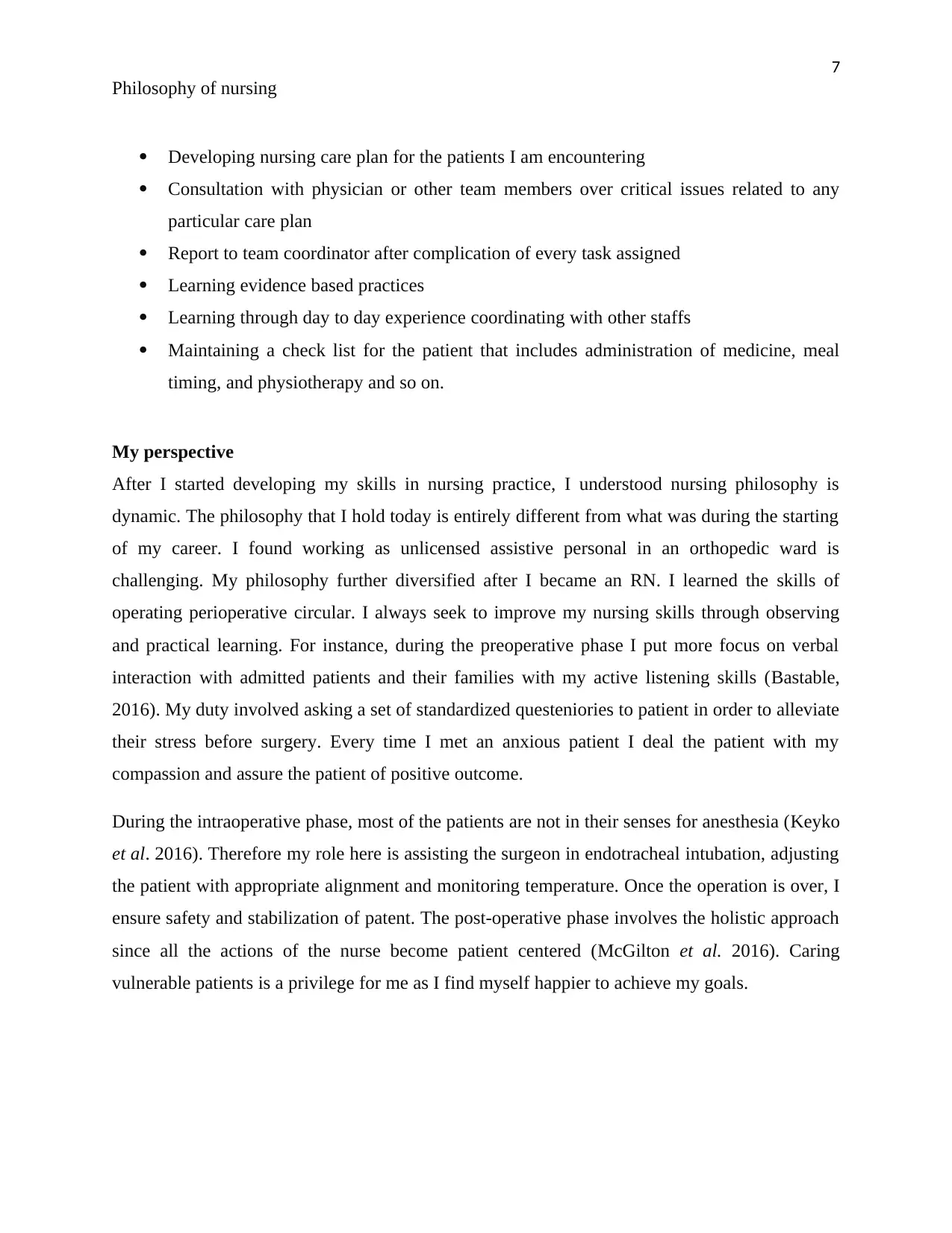
7
Philosophy of nursing
Developing nursing care plan for the patients I am encountering
Consultation with physician or other team members over critical issues related to any
particular care plan
Report to team coordinator after complication of every task assigned
Learning evidence based practices
Learning through day to day experience coordinating with other staffs
Maintaining a check list for the patient that includes administration of medicine, meal
timing, and physiotherapy and so on.
My perspective
After I started developing my skills in nursing practice, I understood nursing philosophy is
dynamic. The philosophy that I hold today is entirely different from what was during the starting
of my career. I found working as unlicensed assistive personal in an orthopedic ward is
challenging. My philosophy further diversified after I became an RN. I learned the skills of
operating perioperative circular. I always seek to improve my nursing skills through observing
and practical learning. For instance, during the preoperative phase I put more focus on verbal
interaction with admitted patients and their families with my active listening skills (Bastable,
2016). My duty involved asking a set of standardized questeniories to patient in order to alleviate
their stress before surgery. Every time I met an anxious patient I deal the patient with my
compassion and assure the patient of positive outcome.
During the intraoperative phase, most of the patients are not in their senses for anesthesia (Keyko
et al. 2016). Therefore my role here is assisting the surgeon in endotracheal intubation, adjusting
the patient with appropriate alignment and monitoring temperature. Once the operation is over, I
ensure safety and stabilization of patent. The post-operative phase involves the holistic approach
since all the actions of the nurse become patient centered (McGilton et al. 2016). Caring
vulnerable patients is a privilege for me as I find myself happier to achieve my goals.
Philosophy of nursing
Developing nursing care plan for the patients I am encountering
Consultation with physician or other team members over critical issues related to any
particular care plan
Report to team coordinator after complication of every task assigned
Learning evidence based practices
Learning through day to day experience coordinating with other staffs
Maintaining a check list for the patient that includes administration of medicine, meal
timing, and physiotherapy and so on.
My perspective
After I started developing my skills in nursing practice, I understood nursing philosophy is
dynamic. The philosophy that I hold today is entirely different from what was during the starting
of my career. I found working as unlicensed assistive personal in an orthopedic ward is
challenging. My philosophy further diversified after I became an RN. I learned the skills of
operating perioperative circular. I always seek to improve my nursing skills through observing
and practical learning. For instance, during the preoperative phase I put more focus on verbal
interaction with admitted patients and their families with my active listening skills (Bastable,
2016). My duty involved asking a set of standardized questeniories to patient in order to alleviate
their stress before surgery. Every time I met an anxious patient I deal the patient with my
compassion and assure the patient of positive outcome.
During the intraoperative phase, most of the patients are not in their senses for anesthesia (Keyko
et al. 2016). Therefore my role here is assisting the surgeon in endotracheal intubation, adjusting
the patient with appropriate alignment and monitoring temperature. Once the operation is over, I
ensure safety and stabilization of patent. The post-operative phase involves the holistic approach
since all the actions of the nurse become patient centered (McGilton et al. 2016). Caring
vulnerable patients is a privilege for me as I find myself happier to achieve my goals.
Paraphrase This Document
Need a fresh take? Get an instant paraphrase of this document with our AI Paraphraser
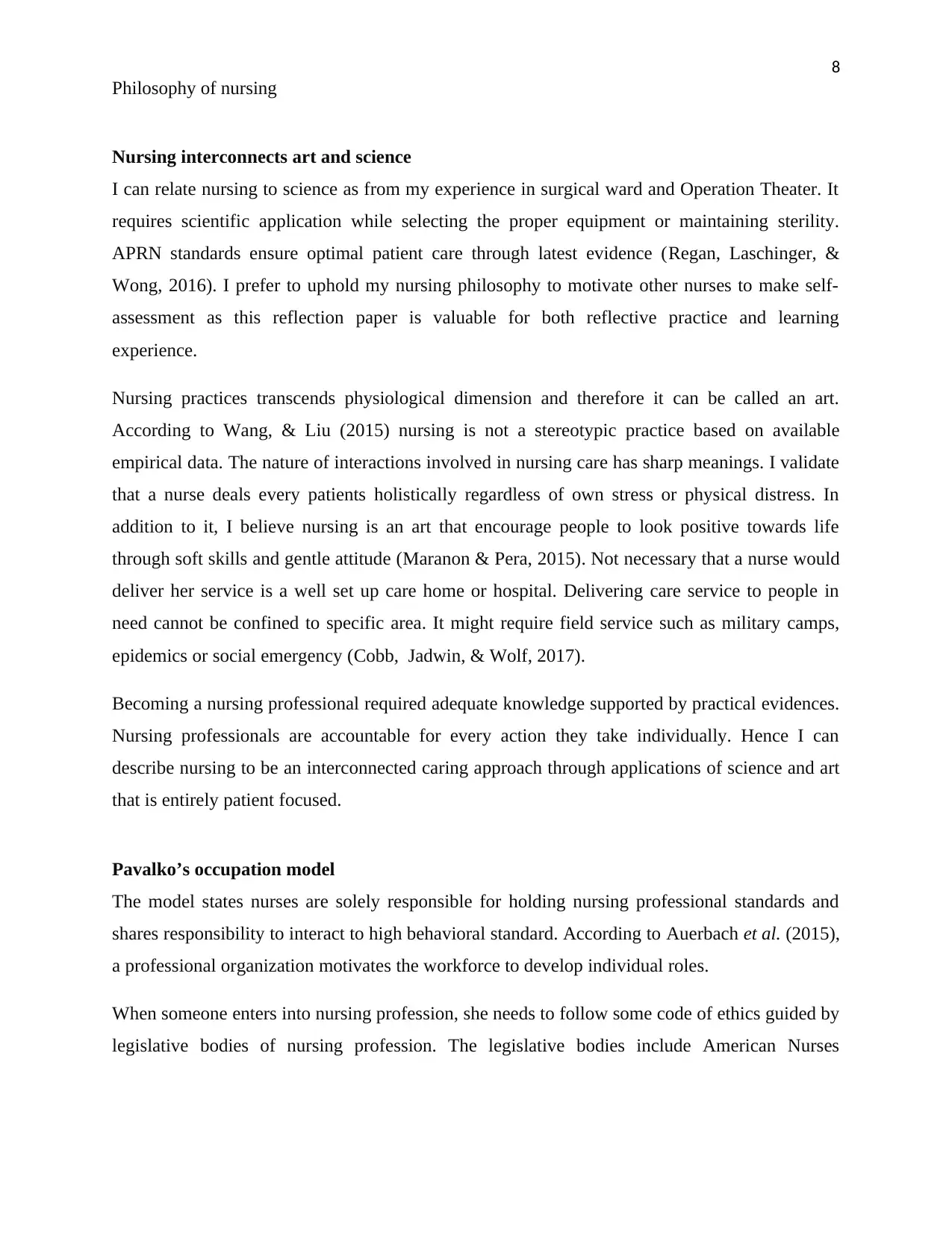
8
Philosophy of nursing
Nursing interconnects art and science
I can relate nursing to science as from my experience in surgical ward and Operation Theater. It
requires scientific application while selecting the proper equipment or maintaining sterility.
APRN standards ensure optimal patient care through latest evidence (Regan, Laschinger, &
Wong, 2016). I prefer to uphold my nursing philosophy to motivate other nurses to make self-
assessment as this reflection paper is valuable for both reflective practice and learning
experience.
Nursing practices transcends physiological dimension and therefore it can be called an art.
According to Wang, & Liu (2015) nursing is not a stereotypic practice based on available
empirical data. The nature of interactions involved in nursing care has sharp meanings. I validate
that a nurse deals every patients holistically regardless of own stress or physical distress. In
addition to it, I believe nursing is an art that encourage people to look positive towards life
through soft skills and gentle attitude (Maranon & Pera, 2015). Not necessary that a nurse would
deliver her service is a well set up care home or hospital. Delivering care service to people in
need cannot be confined to specific area. It might require field service such as military camps,
epidemics or social emergency (Cobb, Jadwin, & Wolf, 2017).
Becoming a nursing professional required adequate knowledge supported by practical evidences.
Nursing professionals are accountable for every action they take individually. Hence I can
describe nursing to be an interconnected caring approach through applications of science and art
that is entirely patient focused.
Pavalko’s occupation model
The model states nurses are solely responsible for holding nursing professional standards and
shares responsibility to interact to high behavioral standard. According to Auerbach et al. (2015),
a professional organization motivates the workforce to develop individual roles.
When someone enters into nursing profession, she needs to follow some code of ethics guided by
legislative bodies of nursing profession. The legislative bodies include American Nurses
Philosophy of nursing
Nursing interconnects art and science
I can relate nursing to science as from my experience in surgical ward and Operation Theater. It
requires scientific application while selecting the proper equipment or maintaining sterility.
APRN standards ensure optimal patient care through latest evidence (Regan, Laschinger, &
Wong, 2016). I prefer to uphold my nursing philosophy to motivate other nurses to make self-
assessment as this reflection paper is valuable for both reflective practice and learning
experience.
Nursing practices transcends physiological dimension and therefore it can be called an art.
According to Wang, & Liu (2015) nursing is not a stereotypic practice based on available
empirical data. The nature of interactions involved in nursing care has sharp meanings. I validate
that a nurse deals every patients holistically regardless of own stress or physical distress. In
addition to it, I believe nursing is an art that encourage people to look positive towards life
through soft skills and gentle attitude (Maranon & Pera, 2015). Not necessary that a nurse would
deliver her service is a well set up care home or hospital. Delivering care service to people in
need cannot be confined to specific area. It might require field service such as military camps,
epidemics or social emergency (Cobb, Jadwin, & Wolf, 2017).
Becoming a nursing professional required adequate knowledge supported by practical evidences.
Nursing professionals are accountable for every action they take individually. Hence I can
describe nursing to be an interconnected caring approach through applications of science and art
that is entirely patient focused.
Pavalko’s occupation model
The model states nurses are solely responsible for holding nursing professional standards and
shares responsibility to interact to high behavioral standard. According to Auerbach et al. (2015),
a professional organization motivates the workforce to develop individual roles.
When someone enters into nursing profession, she needs to follow some code of ethics guided by
legislative bodies of nursing profession. The legislative bodies include American Nurses
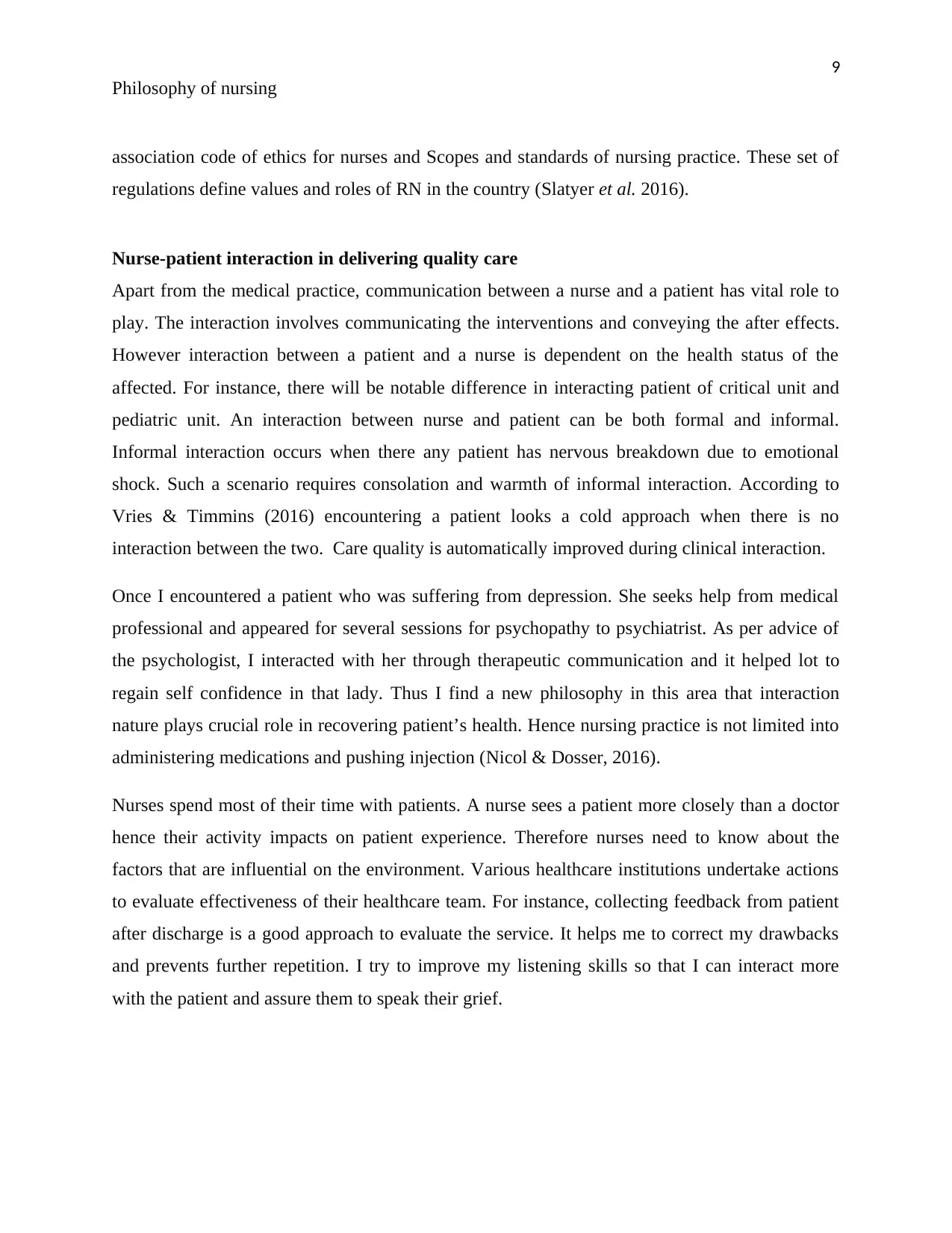
9
Philosophy of nursing
association code of ethics for nurses and Scopes and standards of nursing practice. These set of
regulations define values and roles of RN in the country (Slatyer et al. 2016).
Nurse-patient interaction in delivering quality care
Apart from the medical practice, communication between a nurse and a patient has vital role to
play. The interaction involves communicating the interventions and conveying the after effects.
However interaction between a patient and a nurse is dependent on the health status of the
affected. For instance, there will be notable difference in interacting patient of critical unit and
pediatric unit. An interaction between nurse and patient can be both formal and informal.
Informal interaction occurs when there any patient has nervous breakdown due to emotional
shock. Such a scenario requires consolation and warmth of informal interaction. According to
Vries & Timmins (2016) encountering a patient looks a cold approach when there is no
interaction between the two. Care quality is automatically improved during clinical interaction.
Once I encountered a patient who was suffering from depression. She seeks help from medical
professional and appeared for several sessions for psychopathy to psychiatrist. As per advice of
the psychologist, I interacted with her through therapeutic communication and it helped lot to
regain self confidence in that lady. Thus I find a new philosophy in this area that interaction
nature plays crucial role in recovering patient’s health. Hence nursing practice is not limited into
administering medications and pushing injection (Nicol & Dosser, 2016).
Nurses spend most of their time with patients. A nurse sees a patient more closely than a doctor
hence their activity impacts on patient experience. Therefore nurses need to know about the
factors that are influential on the environment. Various healthcare institutions undertake actions
to evaluate effectiveness of their healthcare team. For instance, collecting feedback from patient
after discharge is a good approach to evaluate the service. It helps me to correct my drawbacks
and prevents further repetition. I try to improve my listening skills so that I can interact more
with the patient and assure them to speak their grief.
Philosophy of nursing
association code of ethics for nurses and Scopes and standards of nursing practice. These set of
regulations define values and roles of RN in the country (Slatyer et al. 2016).
Nurse-patient interaction in delivering quality care
Apart from the medical practice, communication between a nurse and a patient has vital role to
play. The interaction involves communicating the interventions and conveying the after effects.
However interaction between a patient and a nurse is dependent on the health status of the
affected. For instance, there will be notable difference in interacting patient of critical unit and
pediatric unit. An interaction between nurse and patient can be both formal and informal.
Informal interaction occurs when there any patient has nervous breakdown due to emotional
shock. Such a scenario requires consolation and warmth of informal interaction. According to
Vries & Timmins (2016) encountering a patient looks a cold approach when there is no
interaction between the two. Care quality is automatically improved during clinical interaction.
Once I encountered a patient who was suffering from depression. She seeks help from medical
professional and appeared for several sessions for psychopathy to psychiatrist. As per advice of
the psychologist, I interacted with her through therapeutic communication and it helped lot to
regain self confidence in that lady. Thus I find a new philosophy in this area that interaction
nature plays crucial role in recovering patient’s health. Hence nursing practice is not limited into
administering medications and pushing injection (Nicol & Dosser, 2016).
Nurses spend most of their time with patients. A nurse sees a patient more closely than a doctor
hence their activity impacts on patient experience. Therefore nurses need to know about the
factors that are influential on the environment. Various healthcare institutions undertake actions
to evaluate effectiveness of their healthcare team. For instance, collecting feedback from patient
after discharge is a good approach to evaluate the service. It helps me to correct my drawbacks
and prevents further repetition. I try to improve my listening skills so that I can interact more
with the patient and assure them to speak their grief.
⊘ This is a preview!⊘
Do you want full access?
Subscribe today to unlock all pages.

Trusted by 1+ million students worldwide
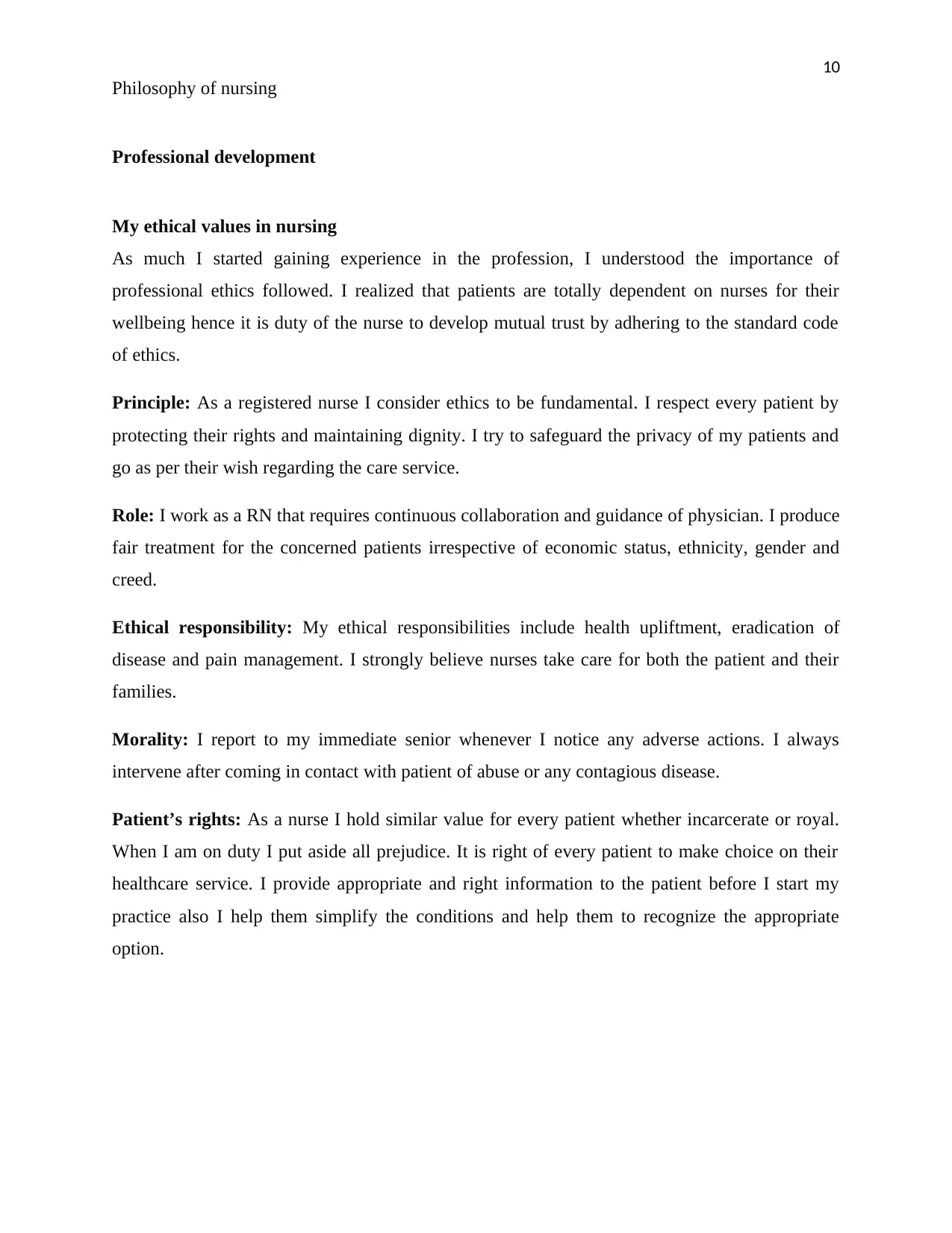
10
Philosophy of nursing
Professional development
My ethical values in nursing
As much I started gaining experience in the profession, I understood the importance of
professional ethics followed. I realized that patients are totally dependent on nurses for their
wellbeing hence it is duty of the nurse to develop mutual trust by adhering to the standard code
of ethics.
Principle: As a registered nurse I consider ethics to be fundamental. I respect every patient by
protecting their rights and maintaining dignity. I try to safeguard the privacy of my patients and
go as per their wish regarding the care service.
Role: I work as a RN that requires continuous collaboration and guidance of physician. I produce
fair treatment for the concerned patients irrespective of economic status, ethnicity, gender and
creed.
Ethical responsibility: My ethical responsibilities include health upliftment, eradication of
disease and pain management. I strongly believe nurses take care for both the patient and their
families.
Morality: I report to my immediate senior whenever I notice any adverse actions. I always
intervene after coming in contact with patient of abuse or any contagious disease.
Patient’s rights: As a nurse I hold similar value for every patient whether incarcerate or royal.
When I am on duty I put aside all prejudice. It is right of every patient to make choice on their
healthcare service. I provide appropriate and right information to the patient before I start my
practice also I help them simplify the conditions and help them to recognize the appropriate
option.
Philosophy of nursing
Professional development
My ethical values in nursing
As much I started gaining experience in the profession, I understood the importance of
professional ethics followed. I realized that patients are totally dependent on nurses for their
wellbeing hence it is duty of the nurse to develop mutual trust by adhering to the standard code
of ethics.
Principle: As a registered nurse I consider ethics to be fundamental. I respect every patient by
protecting their rights and maintaining dignity. I try to safeguard the privacy of my patients and
go as per their wish regarding the care service.
Role: I work as a RN that requires continuous collaboration and guidance of physician. I produce
fair treatment for the concerned patients irrespective of economic status, ethnicity, gender and
creed.
Ethical responsibility: My ethical responsibilities include health upliftment, eradication of
disease and pain management. I strongly believe nurses take care for both the patient and their
families.
Morality: I report to my immediate senior whenever I notice any adverse actions. I always
intervene after coming in contact with patient of abuse or any contagious disease.
Patient’s rights: As a nurse I hold similar value for every patient whether incarcerate or royal.
When I am on duty I put aside all prejudice. It is right of every patient to make choice on their
healthcare service. I provide appropriate and right information to the patient before I start my
practice also I help them simplify the conditions and help them to recognize the appropriate
option.
Paraphrase This Document
Need a fresh take? Get an instant paraphrase of this document with our AI Paraphraser
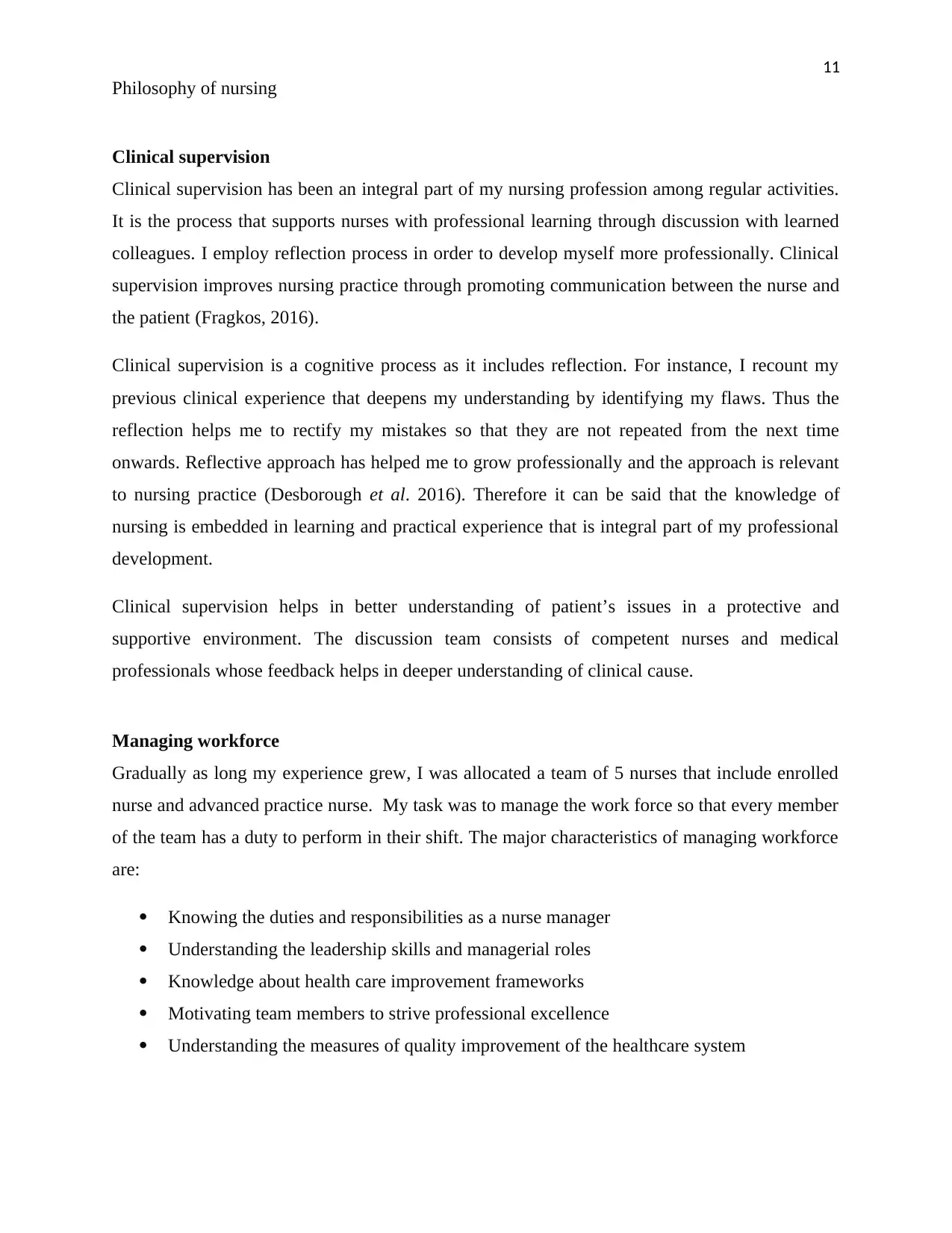
11
Philosophy of nursing
Clinical supervision
Clinical supervision has been an integral part of my nursing profession among regular activities.
It is the process that supports nurses with professional learning through discussion with learned
colleagues. I employ reflection process in order to develop myself more professionally. Clinical
supervision improves nursing practice through promoting communication between the nurse and
the patient (Fragkos, 2016).
Clinical supervision is a cognitive process as it includes reflection. For instance, I recount my
previous clinical experience that deepens my understanding by identifying my flaws. Thus the
reflection helps me to rectify my mistakes so that they are not repeated from the next time
onwards. Reflective approach has helped me to grow professionally and the approach is relevant
to nursing practice (Desborough et al. 2016). Therefore it can be said that the knowledge of
nursing is embedded in learning and practical experience that is integral part of my professional
development.
Clinical supervision helps in better understanding of patient’s issues in a protective and
supportive environment. The discussion team consists of competent nurses and medical
professionals whose feedback helps in deeper understanding of clinical cause.
Managing workforce
Gradually as long my experience grew, I was allocated a team of 5 nurses that include enrolled
nurse and advanced practice nurse. My task was to manage the work force so that every member
of the team has a duty to perform in their shift. The major characteristics of managing workforce
are:
Knowing the duties and responsibilities as a nurse manager
Understanding the leadership skills and managerial roles
Knowledge about health care improvement frameworks
Motivating team members to strive professional excellence
Understanding the measures of quality improvement of the healthcare system
Philosophy of nursing
Clinical supervision
Clinical supervision has been an integral part of my nursing profession among regular activities.
It is the process that supports nurses with professional learning through discussion with learned
colleagues. I employ reflection process in order to develop myself more professionally. Clinical
supervision improves nursing practice through promoting communication between the nurse and
the patient (Fragkos, 2016).
Clinical supervision is a cognitive process as it includes reflection. For instance, I recount my
previous clinical experience that deepens my understanding by identifying my flaws. Thus the
reflection helps me to rectify my mistakes so that they are not repeated from the next time
onwards. Reflective approach has helped me to grow professionally and the approach is relevant
to nursing practice (Desborough et al. 2016). Therefore it can be said that the knowledge of
nursing is embedded in learning and practical experience that is integral part of my professional
development.
Clinical supervision helps in better understanding of patient’s issues in a protective and
supportive environment. The discussion team consists of competent nurses and medical
professionals whose feedback helps in deeper understanding of clinical cause.
Managing workforce
Gradually as long my experience grew, I was allocated a team of 5 nurses that include enrolled
nurse and advanced practice nurse. My task was to manage the work force so that every member
of the team has a duty to perform in their shift. The major characteristics of managing workforce
are:
Knowing the duties and responsibilities as a nurse manager
Understanding the leadership skills and managerial roles
Knowledge about health care improvement frameworks
Motivating team members to strive professional excellence
Understanding the measures of quality improvement of the healthcare system
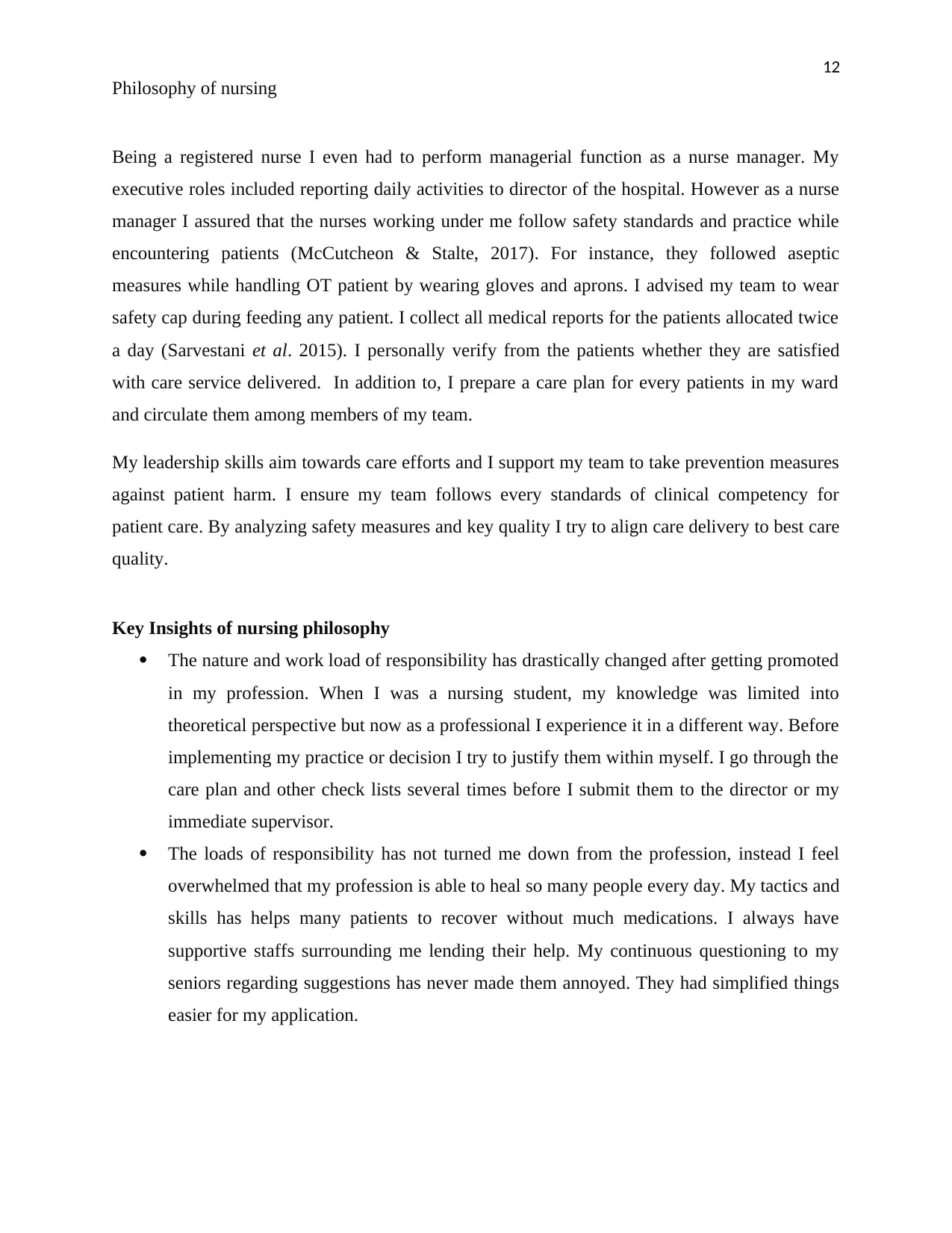
12
Philosophy of nursing
Being a registered nurse I even had to perform managerial function as a nurse manager. My
executive roles included reporting daily activities to director of the hospital. However as a nurse
manager I assured that the nurses working under me follow safety standards and practice while
encountering patients (McCutcheon & Stalte, 2017). For instance, they followed aseptic
measures while handling OT patient by wearing gloves and aprons. I advised my team to wear
safety cap during feeding any patient. I collect all medical reports for the patients allocated twice
a day (Sarvestani et al. 2015). I personally verify from the patients whether they are satisfied
with care service delivered. In addition to, I prepare a care plan for every patients in my ward
and circulate them among members of my team.
My leadership skills aim towards care efforts and I support my team to take prevention measures
against patient harm. I ensure my team follows every standards of clinical competency for
patient care. By analyzing safety measures and key quality I try to align care delivery to best care
quality.
Key Insights of nursing philosophy
The nature and work load of responsibility has drastically changed after getting promoted
in my profession. When I was a nursing student, my knowledge was limited into
theoretical perspective but now as a professional I experience it in a different way. Before
implementing my practice or decision I try to justify them within myself. I go through the
care plan and other check lists several times before I submit them to the director or my
immediate supervisor.
The loads of responsibility has not turned me down from the profession, instead I feel
overwhelmed that my profession is able to heal so many people every day. My tactics and
skills has helps many patients to recover without much medications. I always have
supportive staffs surrounding me lending their help. My continuous questioning to my
seniors regarding suggestions has never made them annoyed. They had simplified things
easier for my application.
Philosophy of nursing
Being a registered nurse I even had to perform managerial function as a nurse manager. My
executive roles included reporting daily activities to director of the hospital. However as a nurse
manager I assured that the nurses working under me follow safety standards and practice while
encountering patients (McCutcheon & Stalte, 2017). For instance, they followed aseptic
measures while handling OT patient by wearing gloves and aprons. I advised my team to wear
safety cap during feeding any patient. I collect all medical reports for the patients allocated twice
a day (Sarvestani et al. 2015). I personally verify from the patients whether they are satisfied
with care service delivered. In addition to, I prepare a care plan for every patients in my ward
and circulate them among members of my team.
My leadership skills aim towards care efforts and I support my team to take prevention measures
against patient harm. I ensure my team follows every standards of clinical competency for
patient care. By analyzing safety measures and key quality I try to align care delivery to best care
quality.
Key Insights of nursing philosophy
The nature and work load of responsibility has drastically changed after getting promoted
in my profession. When I was a nursing student, my knowledge was limited into
theoretical perspective but now as a professional I experience it in a different way. Before
implementing my practice or decision I try to justify them within myself. I go through the
care plan and other check lists several times before I submit them to the director or my
immediate supervisor.
The loads of responsibility has not turned me down from the profession, instead I feel
overwhelmed that my profession is able to heal so many people every day. My tactics and
skills has helps many patients to recover without much medications. I always have
supportive staffs surrounding me lending their help. My continuous questioning to my
seniors regarding suggestions has never made them annoyed. They had simplified things
easier for my application.
⊘ This is a preview!⊘
Do you want full access?
Subscribe today to unlock all pages.

Trusted by 1+ million students worldwide
1 out of 17
Related Documents
Your All-in-One AI-Powered Toolkit for Academic Success.
+13062052269
info@desklib.com
Available 24*7 on WhatsApp / Email
![[object Object]](/_next/static/media/star-bottom.7253800d.svg)
Unlock your academic potential
Copyright © 2020–2026 A2Z Services. All Rights Reserved. Developed and managed by ZUCOL.





